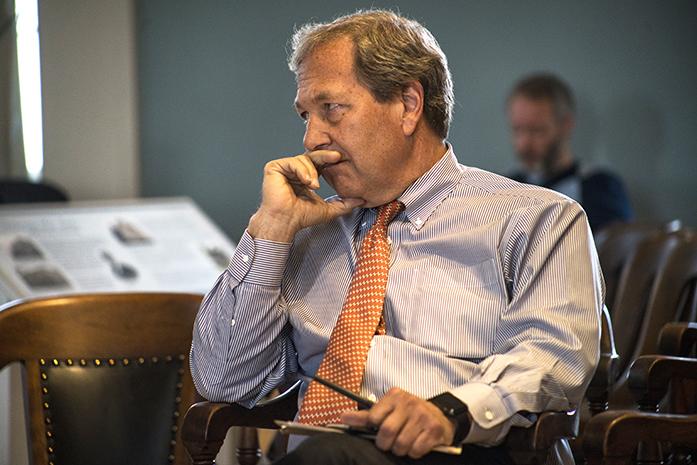Marcus Brown
[email protected]
President Bruce Harreld, alongside the Just Living Theme Semester Planning Committee, engaged in a panel discussion that quickly digressed into a cringe-worthy gauntlet Monday in the Old Capitol. The aim of the discussion was to discuss the progression and application of this semester’s social-justice theme and how it could be further implemented. It quickly became apparent amid the shouting from the audience that perhaps the president and the committee opened themselves up to a dialogue they were not adequately prepared to address.
As previously stated, this semester’s theme is “Just Living,” which has inspired the university to try to combat issues of social justice through numerous media on campus, such as 139 courses offered with the intention of pairing with the theme and gallery exhibitions, among others. However, this theme has presented a unique issue and calls into question an institution of higher learning’s responsibility to combat the very issues it perpetuates by virtue of its nature.
The panel at times appeared to form a defensive huddle with Harreld to the side, head in hand, preferring to deflect angry interjections from the crowd to the panel. At one point it was suggested to stop fielding questions for the sake of the dialogue. Although well-intentioned, the intended conversation about social justice brought to the surface issues the university’s own perceived failings when it comes to accountability to students and faculty. After observing the panel, UI junior Brad Pector went so far as to say that it was “incredibly hypocritical that he is trying to engage in this conversation,” which is a sentiment that seemed to be echoed by a large majority of the crowd.
Issues ranging from the loophole that would exclude university students from the recent raise in the minimum wage for Johnson County to the plight of faculty living on the brink of poverty because of the pay disparity between adjunct and full-time employment were raised with little to no actual plans to remedy them. By trying to confine the issue to the scale that suited the members, the panel unwittingly revealed the paradox of promoting social justice in a system that perpetuates cultures of inequality, elitism, white supremacy, and patriarchy inherent in the very foundations of institutions of higher learning. As productive as panel discussions and dialogue can be, the reactions from the audience made it clear that action is what is being demanded, not more discussion.
It is commendable to try to engage with the community and student body, but one does not get to speak on an issue without becoming the subject of the same scrutiny. This was a lesson Harreld has appeared to have learned the hard way with many accusations of malfeasance being directed at him and his reluctance to speak on his own stewardship of the university. Despite what could be an earnest attempt at enacting substantial change to the campus environment, the result was the slow crumbling of a glass house.
The university cannot try to tackle issues that extend far beyond the confines of the campus, and have in fact been festering in this country as a whole for centuries, without first being prepared to address issues on the university itself. Doing so makes any attempt at change appear disingenuous and ultimately serve to make the process more difficult, because you cannot build on the trust of the community when you haven’t earned it yet.



